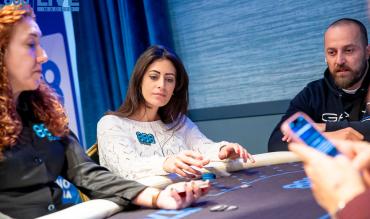When it comes to the poker term, tells, you’ve probably heard all the classics:
- Strong means weak
- Weak means strong
- Or a player drinking water after a bet means they have it.
While a lot of tells should be left for Hollywood, there are also ones you should know about.
I'm 888poker ambassador, Vivian Saliba. In the video below, I share five tips for spotting tells and gaining more information on your opponents.
Tip 1: Pay Attention to Bet Sizes
Once you've played with an opponent for some time, you should know their standard betting sizes.
Let’s say someone has raised twice before to 3x the big blind. On one of the occasions, you got to showdown and saw that the player in question had a very weak hand.
Now, the same player has changed their pattern and is raising to 5x the big blind. This change indicates that they might have a stronger poker hand than before.
Even though you shouldn’t base all your decisions on inconsistent betting sizes, this “tell” may sometimes help.
Tip 2: Timing Tells

The amount of time a player takes before making a decision can tell you a lot about the strength of their hand.
Imagine that you are in the Hijack (HJ) and the first to raise. Without taking a moment to consider their options, the player in the CO moves all-in.
All the other players fold, and you need to decide whether you will call the all-in.
The player in the Cutoff (CO) didn’t even consider calling your raise or 3betting. They had already decided to put all their chips in the middle, disregarding any other actions.
The quickness of the all-in indicates that they will usually have a strong poker combo.
We can fold the weaker part of our standard calling range in this instance.
Tip 3: Contradictory Behaviour

For some unknown reason, players intentionally show tells, hoping to interfere with their opponents' decision-making process.
And for even more unknown reasons, in some cases, it works!
Say a player is facing a river bet:
- They take a long time to act.
- They sigh several times.
- They show signs of being puzzled by the poker board.
Then they move all-in.. They probably have a very strong hand.
The fact that they behaved weakly and took such a decisive action as going all-in is contradictory.
That tell can reveal a lot about their hand’s strength.
Tip 4: Pay Attention to Body Language
Looking for micro expressions showing distress or excitement during a hand is crucial.
But you should also look for signs before entering a hand.

Imagine you are considering raising a weak holding. While deciding, you notice a player who has been on their phone the whole time, has put it away and is focused and looking attentively at you.
This tell can strongly indicate that the player will enter the hand, potentially re-raising you. So, you may want to fold your weaker hands in this spot.
Tells like this can save you a lot of chips in the long run.
Tip 5: Table Awareness
One of the biggest mistakes players make when playing live poker is not paying enough attention to hands they aren’t involved in.
You lose the opportunity to gain information on your opponents if you are -
- Scrolling on social media
- Talking to someone seated next to you.
- Or lost in your thoughts while listening to your favourite beats.
By paying attention to every action, you can determine patterns and learn about your opponents' emotional states.

For example, someone who just lost a big pot to a bad beat might play worse and more aggressively in the following hands.
Every bit of information is crucial and essential in detecting other player’s tells.
Made to Learn – Poker Tells Takeaways
You may never know if someone touching their face means they're bluffing. However, paying attention at the poker table can provide valuable information.
This knowledge will give you an edge over your opponents and help you make better decisions at the poker table.
